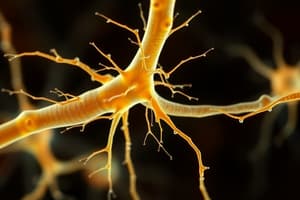Podcast
Questions and Answers
What is primarily believed to occur during the process that seems wasteful for retaining memories prior to 4 years of age?
What is primarily believed to occur during the process that seems wasteful for retaining memories prior to 4 years of age?
What characteristic of the brain allows it to modify its structure and function in response to injury?
What characteristic of the brain allows it to modify its structure and function in response to injury?
At what age does the critical period for visual pathways reach its peak?
At what age does the critical period for visual pathways reach its peak?
Which factor is not involved in stimulating neural plasticity throughout life?
Which factor is not involved in stimulating neural plasticity throughout life?
Signup and view all the answers
What is significant about the production of new neurons in the adult brain?
What is significant about the production of new neurons in the adult brain?
Signup and view all the answers
What happens to an axon segment after it is severed but the neuron’s cell body remains intact?
What happens to an axon segment after it is severed but the neuron’s cell body remains intact?
Signup and view all the answers
What slows the return of function following a peripheral nerve injury?
What slows the return of function following a peripheral nerve injury?
Signup and view all the answers
What is a key reason that learning a language becomes more difficult after adolescence?
What is a key reason that learning a language becomes more difficult after adolescence?
Signup and view all the answers
What initiates the development of the nervous system in the embryo?
What initiates the development of the nervous system in the embryo?
Signup and view all the answers
What is the role of the growth cone during neuronal development?
What is the role of the growth cone during neuronal development?
Signup and view all the answers
What influences the route that an axon follows during its growth?
What influences the route that an axon follows during its growth?
Signup and view all the answers
What happens to newly formed neurons and synapses during development?
What happens to newly formed neurons and synapses during development?
Signup and view all the answers
What is a potential consequence of maternal infections during pregnancy, such as Zika virus?
What is a potential consequence of maternal infections during pregnancy, such as Zika virus?
Signup and view all the answers
Which type of molecules play a significant role in axonal guidance?
Which type of molecules play a significant role in axonal guidance?
Signup and view all the answers
What is the typical fate of 50% to 70% of neurons in the developing central nervous system?
What is the typical fate of 50% to 70% of neurons in the developing central nervous system?
Signup and view all the answers
During which stage do factors like malnutrition and drugs exert effects on the developing fetal nervous system?
During which stage do factors like malnutrition and drugs exert effects on the developing fetal nervous system?
Signup and view all the answers
Study Notes
Growth and Development of Neurons
- Nervous system development starts with divisions of undifferentiated precursor cells (stem cells).
- Each daughter cell from division differentiates, migrates, and develops axons and dendrites.
- Growth cones at the tip of extending axons facilitate correct routing towards specific targets.
- Axon growth is influenced by various molecules, including cell adhesion molecules on glia and soluble neurotrophic factors in the surrounding fluid.
- Neurodevelopment is vulnerable to external factors like alcohol, drugs, and viruses, with potential long-term effects on fetal nervous system, such as microcephaly from Zika virus.
Neuron and Synapse Degeneration
- Post-axon development, a significant proportion of neurons (50%-70%) undergo apoptosis, a programmed cell death process.
- Apoptosis may play a role in refining neural connectivity, contributing to patterns of memory retention, particularly in early childhood.
Neural Plasticity
- The brain exhibits plasticity, allowing structural and functional modifications in response to stimulation or injury.
- Neural plasticity processes include both the generation of new neurons and the remodeling of synaptic connections.
- Exercise and cognitively challenging activities enhance plasticity, which varies with age.
- Visual pathways need stimulation during critical developmental phases (peaks around ages 1-2) for proper processing capability.
- Language acquisition is easier up to adolescence but becomes progressively more difficult thereafter.
Neuronal Circuit Stability and Lifelong Changes
- Major neuronal circuit shapes remain stable after formation, but synaptic connections can be created or removed throughout life.
- New neuron production was previously thought to stop at birth, but evidence shows certain brain regions can regenerate neurons in adulthood.
- Cognitive stimulation and exercise can increase neuron count in learning-associated regions.
- Some antidepressants' effectiveness hinges on the generation of new neurons in emotion-regulating regions.
Axon Regeneration
- Axons can self-repair post-injury if damage occurs outside the CNS and does not impact the cell body.
- Degeneration occurs in the axon segment disconnected from the cell body, while the remaining part generates a growth cone for regrowth towards the effector organ.
- Axon regrowth is slow, averaging about 1 mm per day, leading to delayed functional restoration after peripheral nerve injuries.
- Recovery times can be lengthy; for instance, restoring sensation in a thumb after shoulder injury may take up to 2 years.
Studying That Suits You
Use AI to generate personalized quizzes and flashcards to suit your learning preferences.
Description
Explore the fascinating journey of neuronal growth and differentiation through this quiz. Delve into the processes that lead undifferentiated precursor cells to become specialized neurons. Understand how specific axon growth directs the formation of intricate neuronal networks within the developing nervous system.




